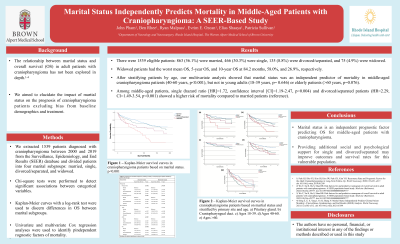Marital Status Independently Predicts Mortality in Middle-Aged Patients with Craniopharyngioma: a SEER-Based Study
Marital Status Independently Predicts Mortality in Middle-aged Patients with Craniopharyngioma: A Seer-based Study
Friday, April 21, 2023


John Pham, BS, BA (he/him/his)
Medical Student
The Warren Alpert Medical School of Brown University
ePoster Presenter(s)
Introduction: The relationship between marital status and overall survival (OS) in adult patients with craniopharyngioma has not been explored in depth. We aimed to elucidate the impact of marital status on the prognosis of craniopharyngioma patients excluding bias from baseline demographics and treatment.
Methods: We extracted 1539 patients diagnosed with craniopharyngioma between 2000 and 2019 from the Surveillance, Epidemiology, and End Results (SEER) database and divided patients into four marital subgroups: married, single, divorced/separated, and widowed. Kaplan-Meier curves with a log-rank test were used to discern differences in OS between marital subgroups. Univariate and multivariate Cox regression were used to identify independent prognostic factors of mortality.
Results: There were 1539 eligible patients: 863 (56.1%) were married, 466 (30.3%) were single, 135 (8.8%) were divorced/separated, and 75 (4.9%) were widowed. Widowed patients had the worst mean OS, 5-year OS, and 10-year OS at 84.2 months, 58.0%, 26.9%, respectively. After stratifying patients by age, our multivariate analysis showed that marital status was an independent predictor of mortality in middle-aged craniopharyngioma patients (40-60 years, p< 0.001), but not in young adults (18-39 years, p= 0.646) or elderly patients (>60 years, p=0.076). Among middle-aged patients, single (hazard ratio [HR]=1.72, confidence interval [CI]=1.19-2.47, p=0.004) and divorced/separated patients (HR=2.29, CI=1.49-3.54, p< 0.001) showed a higher risk of mortality compared to married patients (reference).
Conclusion : Marital status is an independent prognostic factor predicting overall survival for middle-aged patients with craniopharyngioma. Providing additional social and psychological support for single and divorced/separated patients may improve outcomes and survival rates for this vulnerable population.
Methods: We extracted 1539 patients diagnosed with craniopharyngioma between 2000 and 2019 from the Surveillance, Epidemiology, and End Results (SEER) database and divided patients into four marital subgroups: married, single, divorced/separated, and widowed. Kaplan-Meier curves with a log-rank test were used to discern differences in OS between marital subgroups. Univariate and multivariate Cox regression were used to identify independent prognostic factors of mortality.
Results: There were 1539 eligible patients: 863 (56.1%) were married, 466 (30.3%) were single, 135 (8.8%) were divorced/separated, and 75 (4.9%) were widowed. Widowed patients had the worst mean OS, 5-year OS, and 10-year OS at 84.2 months, 58.0%, 26.9%, respectively. After stratifying patients by age, our multivariate analysis showed that marital status was an independent predictor of mortality in middle-aged craniopharyngioma patients (40-60 years, p< 0.001), but not in young adults (18-39 years, p= 0.646) or elderly patients (>60 years, p=0.076). Among middle-aged patients, single (hazard ratio [HR]=1.72, confidence interval [CI]=1.19-2.47, p=0.004) and divorced/separated patients (HR=2.29, CI=1.49-3.54, p< 0.001) showed a higher risk of mortality compared to married patients (reference).
Conclusion : Marital status is an independent prognostic factor predicting overall survival for middle-aged patients with craniopharyngioma. Providing additional social and psychological support for single and divorced/separated patients may improve outcomes and survival rates for this vulnerable population.
